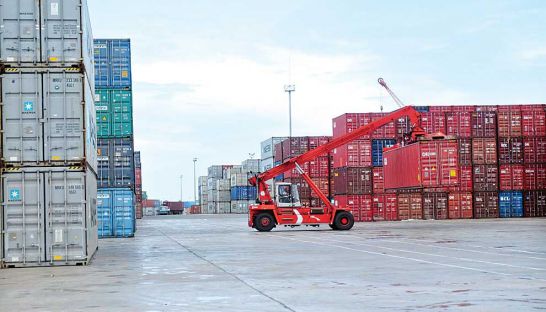Cambodia: Government creates logistics council to help sector stay competitive in the region
The Cambodian government recently laid out the framework for the creation of a National Council of Logistics, a specialised interministerial team designed to tackle the high costs of the Kingdom’s logistics sector to promote the efficient flow of exports, according to a royal decree issued on November 24 and obtained by The Post yesterday.
The council aims to create a master plan that addresses everything from infrastructure challenges to port operations, cross-border trade and customs procedures in order to make the country more competitive in the region. The council will be chaired by a yet-to-be-appointed deputy prime minister, while senior members from the Ministry of Public Works and Transport and the Finance Ministry will also hold leadership positions.
Va Sim Sorya, director-general of the Ministry of Public Works and Transportation (MPWT), said yesterday that the creation of the framework for the council was a solid first step on the long road to addressing issues that have persistently plagued the Cambodian economy. However, he added that potential reforms will only be effective if they are applied across the board.
“The purpose of the council is to create a master plan that will further develop logistics sub-sectors and present reforms that apply to roads, ports, railways, waterways and legal frameworks in a single package,” he said. “In the past, ministries have worked on these issues separately, but having the council in place, we can gather all relevant organisations and work on the issues together.”
The logistics sector spans across several sub-sectors. It includes export procedures, all modes of transportation, storage and distribution capabilities and tracking systems that monitor the flow of goods both domestically and internationally.
According to the 2014 World Bank report, Cambodia’s weak logistical sector has long impeded its progress in building its trade potential, with export costs over 30 percent steeper compared to neighbouring countries.
The Japan International Cooperation Agency (JICA) estimated in a 2016 report that Cambodia charges its exporters a total of $540 per TEU (twenty-foot equivalent unit, the size of a standard container), while Thailand charges just $200 and Vietnam $250.
Sok Chheang, executive director of the Cambodia Trucking Association (CAMTA), said yesterday that the council will help Cambodia reach the same level of cost effectiveness compared to export leaders in the region.
“Having a National Council of Logistics will be very helpful, as we will have a specialised organisation with a greater capacity to address the logistical issues we see in Cambodia than any we’ve had before,” he said.
He added that currently, 49 percent of the costs of logistics are from formal charges, 3 percent are from transportation fees and 48 percent are incurred by informal charges levied by government agencies.
Song Saran, CEO of Amru Rice Cambodia, said the forming of the council is a positive initiative, but stressed the need for the group to establish a master blueprint in the next five to 10 years that will connect logistics seamlessly nationwide, ensuring efficiency and effectiveness of the sector.
“Poor logistics contributes to high costs. They make us uncompetitive, and they have a negative impact on producers of agricultural produce,” he said. “I believe that [forming] a new board is important for us to improve our logistics sector and further improve the strength of our economy.”
Source: http://www.phnompenhpost.com/business/government-creates-logistics-council-help-sector-stay-competitive-region


 English
English




